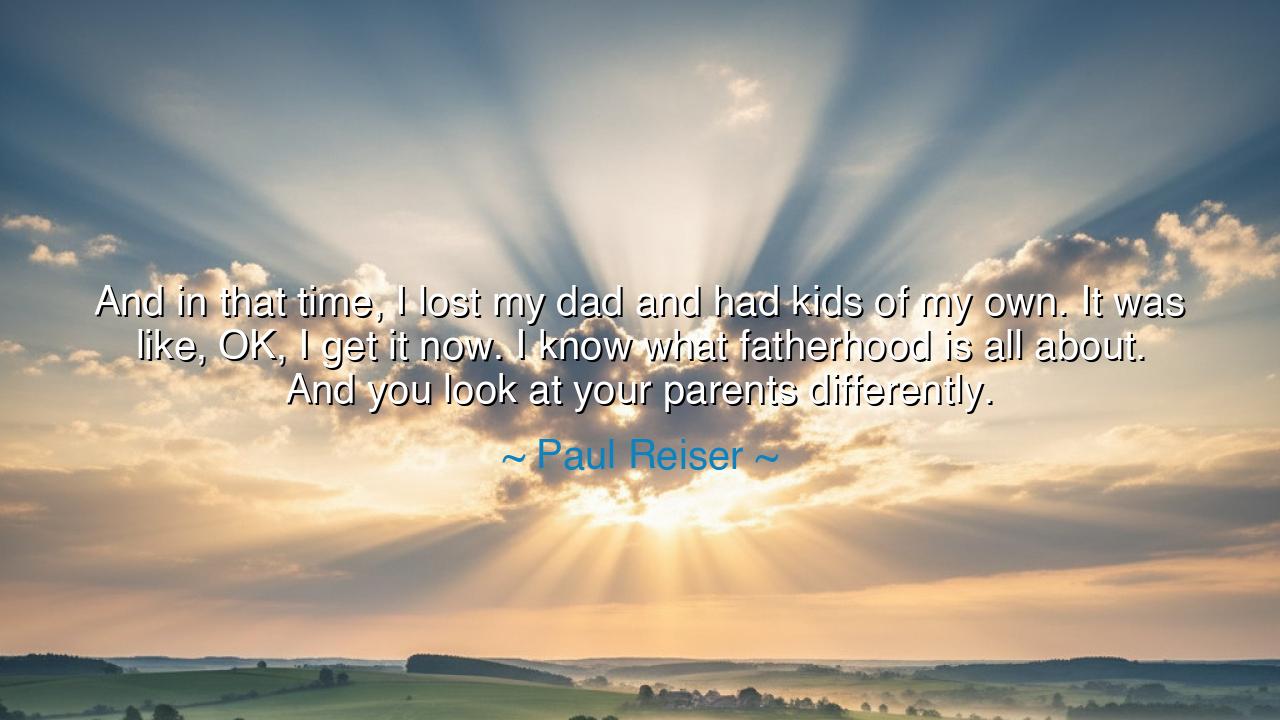
And in that time, I lost my dad and had kids of my own. It was
And in that time, I lost my dad and had kids of my own. It was like, OK, I get it now. I know what fatherhood is all about. And you look at your parents differently.






When Paul Reiser said, “And in that time, I lost my dad and had kids of my own. It was like, OK, I get it now. I know what fatherhood is all about. And you look at your parents differently,” he was not simply recounting events — he was describing a revelation. In his words lives the eternal rhythm of life: loss and renewal, endings and beginnings, the endless turning of generations. Through grief and love, through the sorrow of a son and the joy of a father, he came to understand what the ancients knew well — that wisdom often arrives wrapped in pain, and that to see one’s parents truly, one must first stand in their place.
In the great cycle of human life, fatherhood and sonship are two halves of a single truth. As children, we look upward — seeing our parents as giants, arbiters of fate. As parents, we look downward — seeing our children as fragile mirrors of our former selves. It is only when both visions have been lived that understanding is born. When Reiser says, “I get it now,” he gives voice to this awakening — the moment when love deepens into comprehension, and gratitude rises like dawn after the long night of youth’s self-centeredness. To “look at your parents differently” is to finally perceive them not as symbols, but as souls, human and flawed, who bore the same fears, hopes, and longings that we now carry.
The ancients told of Telemachus, the son of Odysseus, who longed to understand the father he barely knew. When Odysseus finally returned after twenty years, Telemachus looked upon him not with worship, but with recognition — the understanding that his father’s trials were the price of his love. In that moment, the distance between child and parent collapsed, and the torch of wisdom passed from one generation to the next. So too in Reiser’s words: the death of the father and the birth of his own children are not two separate moments, but one — the passing of the flame. Life hands down its lessons in pairs — loss and gift, sorrow and joy, childhood and parenthood.
To lose a parent is to feel the earth shift beneath your feet. The figure who once held the world together is gone, and suddenly, the weight of continuity rests on your shoulders. Yet within that grief lies a seed of transformation. You begin to remember not just what your parents did, but why they did it — the unseen sacrifices, the fears they hid, the tenderness they rarely had time to express. What once seemed stern becomes merciful; what once felt ordinary becomes sacred. It is as if time itself bends, and you are granted the vision to see both forward and backward — to see your father not as he was, but as he became.
Reiser’s reflection speaks to this awakening of empathy, the great teacher of the soul. In becoming a parent, one learns that love is often exhausting, that care is not always rewarded, and that devotion is a labor without end. Only then can we honor our parents fully — not for their perfection, but for their endurance. The ancients would have called this filial wisdom: the understanding that love is measured not by words or ease, but by the constancy of effort. To reach this understanding is to cross a threshold — from being loved to becoming love itself.
We might recall the philosopher Marcus Aurelius, who wrote in his meditations of the lessons he learned from his father: modesty, calmness, and a heart that could endure both triumph and loss. Yet Marcus’s true understanding came only after his father’s death — when he himself was called to guide an empire and a son. So it is with all of us: the living must complete the unspoken lessons of the dead. Our parents’ wisdom is not given in full; it is revealed only as we continue their work.
From this, a lesson emerges for every generation. Life teaches in circles — what we do not understand as children, we learn as parents; what we lose through death, we rediscover through love. To honor our parents, we must live as they hoped we would — patient, kind, and steadfast in the face of life’s turns. To understand them, we must forgive them, for their struggles were not so different from our own. And when our time comes to guide the next generation, let us remember that our children too will not understand — not yet. But one day, they will look back, as Reiser did, and say, “I get it now.”
So, dear listener, cherish your parents while they are here, and when they are gone, honor them by the life you lead. Be gentle with them, and with yourself, for we are all links in the same unending chain — sons who become fathers, daughters who become mothers, each learning the same eternal lesson: that love, once given, never dies. It simply changes form, living on in those who finally understand.






AAdministratorAdministrator
Welcome, honored guests. Please leave a comment, we will respond soon